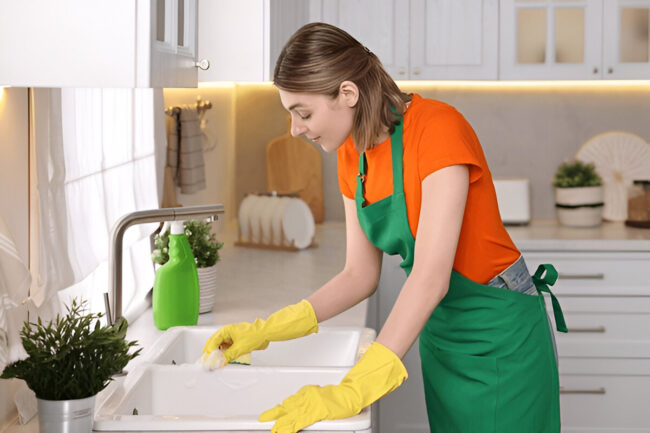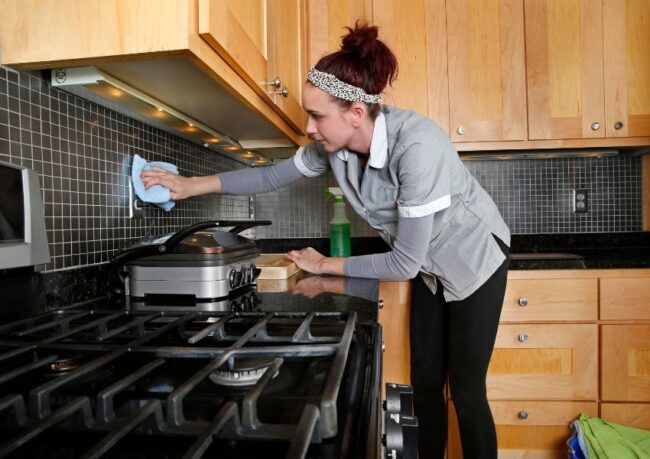
A healthy home requires a clean kitchen, which is one of the most important areas of any home. If you are a tenant, keeping this space clean and hygienic is particularly important for several reasons. When the kitchen is often found to be unclean or damaged, it can endanger your health, create disputes with your landlord, or ultimately prevent you from receiving their full rental bond back. Here’s where cleaning hacks can help.
Cleaning hacks can make the difference between a messy kitchen and one that is generally clean. Continue reading below to learn more about creating cleaning hacks. Using these tips will help you complete tasks more efficiently and with less money, time, and effort.
Unique Challenges of Kitchen Cleaning for Renters
- Health Concerns
For renters, kitchen hygiene poses significant health risks and issues, which tend to be amplified because of limitations resulting when they can’t alter the property, maintenance standards relied on the tenants who used the unit previously were inconsistent, and there is shared responsibility with the landlord or previous tenant.
Cleaning poorly or irregularly may cause residual humidity, especially around sinks and under appliances, creating an environment for mold, mildew, and other potentially harmful substances to develop over time, which are respiratory irritants and can worsen allergies. Poor housekeeping, especially behind appliances and in drawers, can accumulate bacteria and allergens such as dust, pollen, and pet dander. This, in turn, can cause indoor air quality issues and, most importantly, harm the health of tenants. That’s why Bay Property Management Group Philadelphia encourages tenants to test new cleaning products in safe areas of the home.
- Landlord Relations
Common cleaning problems can make the rental experience more difficult and can lead to arguments between landlords and tenants. Conflicts often arise from expectations about how tidy the property should be at the beginning and conclusion of a lease. While tenants may believe that the house was left in acceptable condition, landlords may point out certain areas, such as kitchens, that require more care.
Thorough documentation, including images and checklists for moving in and out, and efficient communication can help reduce these disputes. Maintaining a clean living space and being aware of cleaning responsibilities can greatly improve the landlord-tenant relationship.
- Security Deposit Concerns
A special issue renters face with kitchen cleaning is how it affects the security deposit at move-out. A landlord can subtract from the tenant’s security deposit for cleaning costs if the unit and kitchen are unreasonably dirty or damaged beyond normal wear and tear. For example, not cleaning the oven, microwave, stove, grease buildup on fans and filters, refrigerator, and floor can warrant deductions from the tenant’s security deposit to pay for professional cleaning or repairs.
The problem is that landlords cannot charge tenants for cleaning due to normal wear and tear, such as scratches or fading, but they can charge tenants for cleaning dirt, food residue, or grease that shows the tenant was not keeping the place up. Many lease agreements include lists indicating what cleaning is required in the kitchen, such as degreasing appliances and cleaning underneath the refrigerator and stove, that tenants need to follow.
General Principles for Renter-Friendly Cleaning

- Read your Lease
A legally binding document outlining the conditions of a rental arrangement between a landlord and tenant is called a lease agreement. It contains crucial details including the length of the lease, the amount of the rent, and the obligations of each party. This paper can have a big impact on your cleaning, so it’s important to read it carefully before signing.
Cleaning responsibilities are covered in detail in many lease agreements, albeit these might differ greatly between landlords. It’s critical to comprehend these clauses, particularly as the conclusion of the tenancy time draws near. To name a few, your duties may typically involve regular cleaning, thorough cleaning of the carpets and upholstery, appliance repair and cleaning, trash disposal, and keeping the property “broom-clean”.
- Prioritize Regular Maintenance
The first step in creating a healthy interior environment is routine cleaning. Maintaining cleanliness keeps mold, dust, and allergens out of your home. It is particularly crucial for the safety and well-being of older people, families with young children, and those with respiratory disorders.
It is your duty as a renter to periodically dust hard surfaces, clean floors and carpets, and clear in order to minimize long-term asthma triggers, dust buildup, and pest issues. Maintaining ventilation in the house is crucial. To maintain ideal humidity levels, make sure you utilize the kitchen and bathroom exhausts and open doors and windows occasionally. The well-being of renters and preserving the property’s long-term worth, depend on a clean and healthy indoor living space.
- Use Non-Abrasive Cleaning Methods
When cleaning in a way that’s renter-safe, it is generally a good idea to be non-abrasive. One goal when cleaning is to prevent damage to surfaces and prolong the life of fixtures and finishes in a rental. Simple dish soap and warm water can remove grease from floors, walls, and other surfaces. There are a number of non-abrasive all-purpose cleaners available for use on laminated countertops and painted surfaces.
Baking soda and white vinegar are another cost-effective way to remove grime and deodorize surfaces such as fridges, sinks, and pans. Baking soda is mildly alkaline and mildly abrasive, while white vinegar is acidic. One can add lemon juice to homemade cleaning products. For example, lemon juice contains antibacterial and antiseptic properties. These options are all environmentally-friendly, non-toxic, and biodegradable. Not using harsh chemicals that may damage surfaces and assist in the health and safety of the residents and the environment.
Final Thoughts
One of the most important areas of any home is the kitchen, which must be kept clean for a healthy living environment. Every nook and cranny, including floors, sinks, cabinets, and counters, should be cleaned and sanitized because these areas are prone to becoming dirty over time.
You can employ expert cleaners if you don’t want to take the chance. But you should also familiarize yourself with the straightforward yet practical kitchen cleaning tips we covered earlier. When cleaning your rental home on your own, these tips will come in handy.
